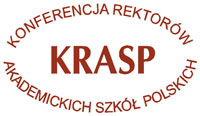 The Modern Business Management Programme (Pol. Nowoczesne Zarządzanie Biznesem – NZB) has been established on the initiative of the Polish Bank Association and at present it is implemented in 122 Polish universities and academies. The programme covers the entire Poland and ensures access to thousands of students and academic teachers. The project is implemented under the belief that the combination of didactic and academic experience with hands-on knowledge will enable us to prepare its addressees better to employ their knowledge in the future jobs in a practical manner.
The Modern Business Management Programme (Pol. Nowoczesne Zarządzanie Biznesem – NZB) has been established on the initiative of the Polish Bank Association and at present it is implemented in 122 Polish universities and academies. The programme covers the entire Poland and ensures access to thousands of students and academic teachers. The project is implemented under the belief that the combination of didactic and academic experience with hands-on knowledge will enable us to prepare its addressees better to employ their knowledge in the future jobs in a practical manner.
Goal:
Its goal is to raise the awareness of the financial market, entrepreneurship and business management through the development of cooperation between the business sector, on the one hand, and universities and academies, on the other hand.
Objectives:
We aim at becoming one of the largest education programmes in Poland which builds a new quality of collaboration between the business and the higher education system. We have the following objectives:
 establish the Polish banking potential
establish the Polish banking potential
 develop social economy
develop social economy
 inspire education-business-finance actions
inspire education-business-finance actions
 participate in the pursuit of goals of the Polish government – combine education with business
participate in the pursuit of goals of the Polish government – combine education with business
 reinforce, build the image of financial establishments
reinforce, build the image of financial establishments
 support succession processes in small and large companies
support succession processes in small and large companies
 increase gradually the economic knowledge in the society, for example by raising the qualifications of the present and future managerial staff and specialists
increase gradually the economic knowledge in the society, for example by raising the qualifications of the present and future managerial staff and specialists
 deepen and promote standards of good and proven business practices by means of enhanced flow of information from education to the economic practice and from the economic practice to education
deepen and promote standards of good and proven business practices by means of enhanced flow of information from education to the economic practice and from the economic practice to education
 provide more effective contributions to the growing efficiency of entrepreneurs and the entire economy
provide more effective contributions to the growing efficiency of entrepreneurs and the entire economy
 ensure effective, high-quality message
ensure effective, high-quality message
Target groups:
 higher education facilities and the so-called Universities of the Third Age
higher education facilities and the so-called Universities of the Third Age
 academics
academics
 students
students
 partners
partners
 business-sector representatives
business-sector representatives
 opinion-forming milieus
opinion-forming milieus

How is the NZB Programme implemented?
 subject-specific lectures given by both academic teachers and practitioners
subject-specific lectures given by both academic teachers and practitioners
 NZB areas at academies and universities
NZB areas at academies and universities
 participation in scientific conferences held by universities, academies and business partners
participation in scientific conferences held by universities, academies and business partners
 organisation of NZB national conferences
organisation of NZB national conferences
 organisation of meetings / debates on economic education
organisation of meetings / debates on economic education
 cyclic training courses for researchers
cyclic training courses for researchers
 subject-related materials to deepen the knowledge on specific thematic modules (course books)
subject-related materials to deepen the knowledge on specific thematic modules (course books)
 international cooperation
international cooperation
 cooperation for student internships
cooperation for student internships
 propagation of the programme in academic and non-academic media plus other forms of promotion
propagation of the programme in academic and non-academic media plus other forms of promotion
 organisation of consultancy forums for the project
organisation of consultancy forums for the project
Benefits for universities and academies:
 enhanced flow of information from education to the economic practice and from the economic practice to education
enhanced flow of information from education to the economic practice and from the economic practice to education
 raising of academic teachers' qualifications for the subject matter in question and students' knowledge level
raising of academic teachers' qualifications for the subject matter in question and students' knowledge level
(the academy/university responds to the needs of the labour market)
 increased competitiveness of academies/universities
increased competitiveness of academies/universities
Benefits for students:
 knowledge outside the curriculum of their studies
knowledge outside the curriculum of their studies
 better preparation for a future job, thus increasing their competitiveness as employees/employers
better preparation for a future job, thus increasing their competitiveness as employees/employers
 a higher level of financial and economic education contributing to the quality of their jobs and personal lives
a higher level of financial and economic education contributing to the quality of their jobs and personal lives
Benefits for partners:
 practical influence on the education programme for students of higher education facilities
practical influence on the education programme for students of higher education facilities
 improvement in the company management level
improvement in the company management level
 contribution to the growing efficiency of entrepreneurs and the economy
contribution to the growing efficiency of entrepreneurs and the economy
 raised qualifications of the present and future managerial staff and specialists
raised qualifications of the present and future managerial staff and specialists
 possibility to implement Corporate Social Responsibility policies (CSR)
possibility to implement Corporate Social Responsibility policies (CSR)
























